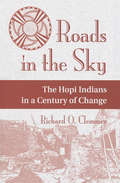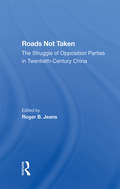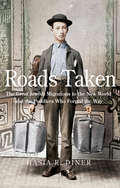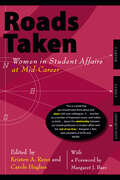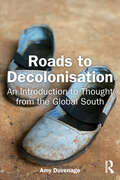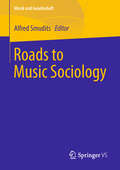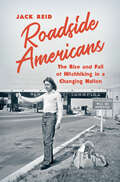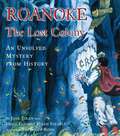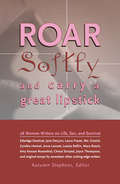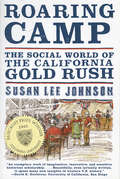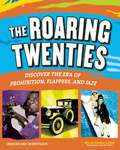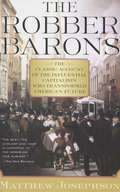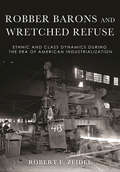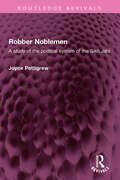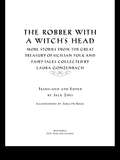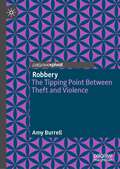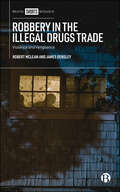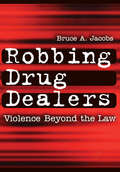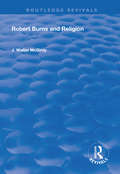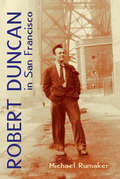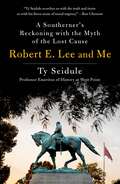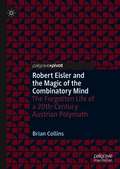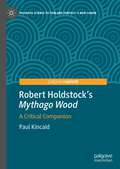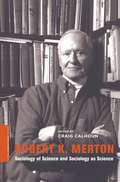- Table View
- List View
Roads In The Sky: The Hopi Indians In A Century Of Change
by Richard O. ClemmerFor the past 100 years, Hopis have had to deal with technological, economic and political changes originating from outside their society. The author documents the ways in which Hopis have used their culture and their socio-political structures to deal with change, focusing on major events in Hopi history. A study of "fourth worlders" coping with a dominant nation state, the book documents Hopi social organization, economy, religion and politics, as well as key events in the history of Hopi-US relations. Despite 100 years of contact with the dominant American culture, Hopi culture today maintains continuity with aboriginal roots while reflecting the impact of the 20th century.
Roads Not Taken: The Struggle Of Opposition Parties In Twentieth-century China
by Edward S Krebs Roger Jeans Parks Coble Marilyn M. LevineStudies of the political history of twentieth-century China traditionally have been skewed toward a two-dimensional view of the major combatants: the Chinese Communist Party and the Guomindang. Although their struggle undeniably has been the main story, it is neither the only nor the complete story. During the Republican period (1912-1949), many ed
Roads Taken
by Hasia R. DinerBetween the late 1700s and the 1920s, nearly one-third of the world's Jews emigrated to new lands. Crossing borders and often oceans, they followed paths paved by intrepid peddlers who preceded them. This book is the first to tell the remarkable story of the Jewish men who put packs on their backs and traveled forth, house to house, farm to farm, mining camp to mining camp, to sell their goods to peoples across the world. Persistent and resourceful, these peddlers propelled a mass migration of Jewish families out of central and eastern Europe, north Africa, and the Ottoman Empire to destinations as far-flung as the United States, Great Britain, South Africa, and Latin America. Hasia Diner tells the story of millions of discontented young Jewish men who sought opportunity abroad, leaving parents, wives, and sweethearts behind. Wherever they went, they learned unfamiliar languages and customs, endured loneliness, battled the elements, and proffered goods from the metropolis to people of the hinterlands. In the Irish Midlands, the Adirondacks of New York, the mining camps of New South Wales, and so many other places, these traveling men brought change--to themselves and the families who later followed, to the women whose homes and communities they entered, and ultimately to the geography of Jewish history.
Roads Taken: Women in Student Affairs at Mid-Career
by Kristen A. Renn Carole HughesThe work of student affairs professionals is demanding and unpredictable. This book addresses the particular challenges that it presents to women in mid-career.While much has been written about new graduate students, new professionals and senior administrators in student affairs, scant attention has been paid to the issues of mid-career, and particularly as they impact women.Here are the stories of over twenty women, from widely different backgrounds, reflecting on their lives at mid-career. They describe the choices they made and share the lessons they have learned, particularly the ever-present concerns about reconciling the demands of work and responsibilities to family and partners . The volume focuses on issues that have particular and significant meaning for women. The individual narratives are grouped into five sections, each beginning with a scholarly introduction to its topics. The sections deal with education and self development, such as the life implications of embarking on a doctorate; dual career couples and such decisions as relocation; choices about having children and responsibilities for the care of aging parents; arriving at mid-career; and alternatives to traditional, linear career progression in student affairs administration.This volume is a particular gift to women currently in mid-career positions in student affairs, women embarking on their personal and professional journey in student affairs, the partners of such women, their colleagues, and the individuals who supervise them.
Roads to Decolonisation: An Introduction to Thought from the Global South
by Amy DuvenageRoads to Decolonisation: An Introduction to Thought from the Global South is an accessible new textbook that provides undergraduate students with a vital introduction to theory from the Global South and key issues of social justice, arming them with the tools to theorise and explain the social world away from dominant Global North perspectives. Arranged in four parts, it examines key thinkers, activists and theory-work from the Global South; theoretical concepts and socio-historical conditions associated with 'race' and racism, gender and sexuality, identity and (un)belonging in a globalised world and decolonisation and education; challenges to dominant Euro-American perspectives on key social justice issues, linking decolonial discourses to contemporary case studies. Each chapter offers an overview of key thinkers and activists whose work engages with social justice issues, many of whom are under-represented or left out of undergraduate humanities and social sciences textbooks in the North. This is essential reading for students of the humanities and social sciences worldwide, as well as scholars keen to embed Southern thought in their curricula and pedagogical practice.
Roads to Music Sociology (Musik Und Gesellschaft Ser.)
by Alfred SmuditsMusic sociology occupies a special position in the social and cultural sciences. The terminology alone – in German it is ‘Musiksoziologie’ and not ‘Soziologie der Musik’ – indicates many possible approaches: Is ‘music sociology’ a subdiscipline within sociology or musicology? Or is it a discipline on its own, espousing significant differences from sociology and musicology alike? On the occasion of its 50th anniversary, the Department of Music Sociology at the mdw – University of Music and Performing Arts Vienna – probably the only one in the world to bear the name as a separate department – decided to clarify the state of music sociology. Some of the world’s most prominent representatives of the discipline were invited to participate in this project and present their own viewpoints on the various approaches to music sociology. Their contributions address the particular research objects of music sociology (institutions of musical life; production, distribution and consumption of music; music-making; ‘works’, genres and repertoires; etc.) as well as the different methods of research (stock-taking, surveys, interviews, music analysis, biographical research, etc.).
Roads to Power: Britain Invents the Infrastructure State
by Jo GuldiRoads to Power tells the story of how Britain built the first nation connected by infrastructure, how a libertarian revolution destroyed a national economy, and how technology caused strangers to stop speaking. In early eighteenth-century Britain, nothing but dirt track ran between most towns. By 1848 the primitive roads were transformed into a network of highways connecting every village and island in the nation—and also dividing them in unforeseen ways. The highway network led to contests for control over everything from road management to market access. Peripheries like the Highlands demanded that centralized government pay for roads they could not afford, while English counties wanted to be spared the cost of underwriting roads to Scotland. The new network also transformed social relationships. Although travelers moved along the same routes, they occupied increasingly isolated spheres. The roads were the product of a new form of government, the infrastructure state, marked by the unprecedented control bureaucrats wielded over decisions relating to everyday life. Does information really work to unite strangers? Do markets unite nations and peoples in common interests? There are lessons here for all who would end poverty or design their markets around the principle of participation. Guldi draws direct connections between traditional infrastructure and the contemporary collapse of the American Rust Belt, the decline of American infrastructure, the digital divide, and net neutrality. In the modern world, infrastructure is our principal tool for forging new communities, but it cannot outlast the control of governance by visionaries.
Roadside Americans: The Rise and Fall of Hitchhiking in a Changing Nation
by Jack ReidBetween the Great Depression and the mid-1970s, hitchhikers were a common sight for motorists, as American service members, students, and adventurers sought out the romance of the road in droves. Beats, hippies, feminists, and civil rights and antiwar activists saw "thumb tripping" as a vehicle for liberation, living out the counterculture's rejection of traditional values. Yet, by the time Ronald Reagan, a former hitchhiker himself, was in the White House, the youthful faces on the road chasing the ghost of Jack Kerouac were largely gone—along with sympathetic portrayals of the practice in state legislatures and the media. In Roadside Americans, Jack Reid traces the rise and fall of hitchhiking, offering vivid accounts of life on the road and how the act of soliciting rides from strangers, and the attitude toward hitchhikers in American society, evolved over time in synch with broader economic, political, and cultural shifts. In doing so, Reid offers insight into significant changes in the United States amid the decline of liberalism and the rise of the Reagan Era.
Roanoke, the Lost Colony: An Unsolved Mystery from History
by Jane Yolen Heidi E. Y. StempleJohn White was chosen to lead a new colony at Roanoke off the Atlantic coast. White went back to England to gather supplies, returned after three years, and found that all had vanished.
Roar Softly and Carry a Great Lipstick
by Autumn StephensThe title of this anthology riffs on Teddy Roosevelt's phallocentric motto, "Speak softly, and carry a big stick." Few American women today are interested in cultivating a Teddyesque machismo -- but in Roar Softly, women writers recount witty and poignant tales of modern-day survival, from finding love (and sex) as a single mom to overcoming anorexia to adopting a child. Not only do their stories offer reassurance that no woman is alone in her struggles, but they also suggest better battle strategies -- more womanly battle strategies, if you will -- for those who shrink from the "muscle your way through" approach. As each essay demonstrates, women can overcome the challenges of their lives not only with strength, but also with grace. Contributors include Anne Lamott, Edwidge Danticat, Mary Roach, Elizabeth Fishel, Laura Fraser, and Anneli Rufus.
Roaring Camp: The Social World of the California Gold Rush
by Susan Lee JohnsonWinner of the 2001 Bancroft Prize. Historical insight is the alchemy that transforms the familiar story of the Gold Rush into something sparkling and new. The world of the Gold Rush that comes down to us through fiction and film--of unshaven men named Stumpy and Kentuck raising hell and panning for gold--is one of half-truths. In this brilliant work of social history, Susan Johnson enters the well-worked diggings of Gold Rush history and strikes a rich lode. She finds a dynamic social world in which the conventions of identity--ethnic, national, and sexual--were reshaped in surprising ways. She gives us the all-male households of the diggings, the mines where the men worked, and the fandango houses where they played. With a keen eye for character and story, Johnson restores the particular social world that issued in the Gold Rush myths we still cherish.
The Roaring Twenties
by Jennifer Keller Marcia Amidon LustedThe 1920s is one of the most fascinating decades in American history, when the seeds of modern American life were sown. It was a time of prosperity and recovery from war, when women's roles began to change and advertising and credit made it desirable and easy to acquire a vast array of new products. But there was a dark side of crime and corruption, racial intolerance, hard times for immigrants and farmers, and an impending financial collapse.The Roaring Twenties: Discover the Era of Prohibition, Flappers, and Jazz explores all the different aspects of the time, from literature and music to politics, fashion, economics, and invention. To experience one of the most vibrant eras in US history, readers will debate the pros and cons of prohibition, create an advertising campaign for a new product, and analyze and compare events leading to the stock market crashes of 1929 and 2008.The Roaring Twenties meets common core state standards in language arts for reading informational text and literary nonfiction and is aligned with Next Generation Science Standards. Guided Reading Levels and Lexile measurements indicate grade level and text complexity.
The Robber Barons: The Classic Account of the Influential Capitalists Who Transformed America's Future
by Matthew Josephson&“The best, the liveliest and most illuminating&” account of Rockefeller, Morgan, and the other men who seized American economic power after the Civil War (The New Republic). John D. Rockefeller, J. P. Morgan, Cornelius Vanderbilt, Andrew Carnegie, E. H. Harriman, Jay Gould, Henry Clay Frick . . . their names carry a powerful historical ring, still echoing today in the countless institutions that are part of their legacy, from universities to museums to banks. But who were the people behind the legends, and how did they rise to their positions of vast wealth and influence in the latter half of the nineteenth century? The Robber Barons is a classic work on the financiers and industrialists of the Gilded Age, who shaped their own era as well as the future of the United States—&“not a mere series of biographies but a genuine history&” (The New York Times Book Review).
Robber Barons and Wretched Refuse: Ethnic and Class Dynamics during the Era of American Industrialization
by Robert F. ZeidelRobber Barons and Wretched Refuse explores the connection between the so-called robber barons who led American big businesses during the Gilded Age and Progressive Era and the immigrants who composed many of their workforces. As Robert F. Zeidel argues, attribution of industrial-era class conflict to an "alien" presence supplements nativism—a sociocultural negativity toward foreign-born residents—as a reason for Americans' dislike and distrust of immigrants. And in the era of American industrialization, employers both relied on immigrants to meet their growing labor needs and blamed them for the frequently violent workplace contentions of the time. Through a sweeping narrative, Zeidel uncovers the connection of immigrants to radical "isms" that gave rise to widespread notions of alien subversives whose presence threatened America's domestic tranquility and the well-being of its residents. Employers, rather than looking at their own practices for causes of workplace conflict, wontedly attributed strikes and other unrest to aliens who either spread pernicious "foreign" doctrines or fell victim to their siren messages. These characterizations transcended nationality or ethnic group, applying at different times to all foreign-born workers.Zeidel concludes that, ironically, stigmatizing immigrants as subversives contributed to the passage of the Quota Acts, which effectively stemmed the flow of wanted foreign workers. Post-war employers argued for preserving America's traditional open door, but the negativity that they had assigned to foreign workers contributed to its closing.
Robber Noblemen: A study of the political system of the Sikh Jats (Routledge Revivals)
by Joyce PettigrewFirst published in 1975, Robber Noblemen represents a break with traditional anthropological studies within the Indian subcontinent in the breadth of its coverage. A whole state, the Punjab, is discussed, with special reference to the social and political organization of its landowning Sikhs: the Jats. Joyce Pettigrew demonstrates that although the Punjab is included within the formal political framework of the Indian Union, it is nevertheless more closely allied to countries on its western border, by virtual of its social structure and value system. The caste system does not exist among the Sikhs. Values sustaining patterns of social and political action are not those pertaining to ritual purity and pollution but are those concerned with the extended family unit: honour, reputation, insult. The author shows how long-standing collaborative relationships between families compete with other similarly formed alliances or ‘factions’ for power and influence. This book will be of interest to students of anthropology, history, political science and South Asian studies.
The Robber with a Witch's Head: More Stories from the Great Treasury of Sicilian Folk and Fairy Tales Collected by Laura Gonzenbach
by Jack Zipes Laura GonzenbachThe Robber with the Witch's Head presents almost fifty new stories about demons and clever maidens and princes. Bursting with life, this is a storyteller's dream, full of adventure and magic, translated by Jack Zipes.
Robbery: The Tipping Point Between Theft and Violence
by Amy BurrellThis book brings together research on personal robbery from psychology, criminology, group dynamics, and youth justice, to provide a comprehensive resource on this crime type. Although robbery is a pressing issue affecting a very high volume of people, it has been under-researched in recent years. This book explores the motivations of offenders, methods of committing personal robbery and the group dynamics involved. The author discusses behavioural crime linkage as a method to help police forces identify serial offences, as well as how profiling has been used in robbery cases. The author concludes by summarising the policing tactics used to prevent and detect robbery, to show how understanding robbery can help in creating workable initiatives around this crime type.
Robbery in the Illegal Drugs Trade: Violence and Vengeance
by Robert McLean James A. DensleyRobbery can be planned or spontaneous and is a typically short, chaotic crime that is comparatively under-researched. This book transports the reader to the streets and focuses on the real-life narratives and motivations of the youth gang members and adult organized criminals immersed in this form of violence. Uniquely focusing on robberies involving drug dealers and users, this book considers the material and emotional gains and losses to offenders and victims, and offers policy recommendations to reduce occurrences of this common crime.
Robbing Drug Dealers: Violence beyond the Law
by Bruce A. JacobsThis volume fills a research gap of striking proportions by exploring the contingencies that mediate the crimes perpetrated on those who are themselves perpetrators. The notion that violence is something that happens only to law-abiding citizens is both widely held and inaccurate. The disproportionate share of victims of crime are, in reality, themselves involved in crime. Yet existing scholarship has failed to explore the contingencies that mediate offenses like drug robbery - from the forces that inspire it, to the methods used to select targets, to the means employed to generate compliance, down to the tactics used to thwart retaliatory attempts after the crime has ended.Given that predatory behavior between and among offenders ultimately spreads to society at large (the ""contagion effect""), a research gap of striking proportions has emerged. The imprudence of robbing other criminals is widely assumed. Yet criminologists paradoxically observe that a major benefit of robbing fellow criminals is that they cannot report the offense to the authorities. Why, then, should offenders elect to reduce their odds of getting arrested at the cost of enhancing their chances of getting killed?Drawing on candid interviews with the perpetrators, Jacobs attempts to answer such questions and fill this gap in the research agenda of criminology. The result is a narrative that explores the world of street-corner drugs from the vantage point of those who actually commit these high-risk crimes. It also introduces serious ethical issues that criminology and law enforcement tend to gloss over or ignore entirely. This work is innovative and troubling at the same time. It takes a theme that Hollywood films have explored in greater depth than social science, and restores it as a crucial part of the ethnography of crime.
Robert Burns and Religion
by Walter McGintyThis title was first published in 2003. This text examines the role of religion in the life of the poet Robert Burns. Incorporating previously unexplored sources, and taking into consideration contemporary work on Burns, and on Scottish literature and history, author J. Walter McGinty presents an account of Burns's personal religion and the factors that helped to form it. McGinty begins by discussing the recurring themes in Burns's religious writings: a belief in a benevolent God; a hankering after, if not a hope, that there might be a life after death; and a sense of his own accountability. He then presents for comparison the religious poetry of two of Burns's contemporaries, William Cowper and Christopher Smart, usefully extending the discussion of Burns beyond the purely Scottish context. Finally, McGinty provides portraits of some of the ministers of "The Church of Scotland's Garland-A New Song", followed by an analysis of Burns's religious poetry.
Robert Duncan in San Francisco
by Michael RumakerA newly expanded edition of an enduring classic, Robert Duncan in San Francisco is both a portrait of the premier poet of the San Francisco Renaissance and a fascinating account of gay life in late 1950s America. Following his graduation from Black Mountain College, Michael Rumaker made his way to the post-Howl, pre-Stonewall gay literary milieu of San Francisco, where he entered the circle of Robert Duncan. His account of that time gives an unvarnished look at Duncan's magnetic personality and occasional failings, while delivering vivid snapshots of other significant poets like Jack Spicer, John Wieners, and Joanne Kyger against the backdrop of legendary North Beach haunts like The Place, Vesuvio, and City Lights Books. Contrasting Duncan's daringly frank homosexuality with his own then-closeted life, Rumaker conjures up with harrowing detail an era of police persecution of a largely clandestine gay community struggling to survive in the otherwise "open city" of San Francisco. First published in 1996, this expanded edition includes a selection of previously unpublished letters between Rumaker and Duncan, and an interview conducted for this edition, in which Rumaker provides further reflections on the poet and the period.Michael Rumaker has written several novels and short story collections, as well as the memoir Black Mountain Days. He was born in Philadelphia, Pennsylvania, and is a graduate of Black Mountain College-where Duncan served as his outside thesis advisor-and Columbia University. He taught at City University of New York and the New School for Social Research.
Robert E. Lee and Me: A Southerner's Reckoning with the Myth of the Lost Cause
by Ty SeiduleIn a forceful but humane narrative, former soldier and head of the West Point history department Ty Seidule's Robert E. Lee and Me challenges the myths and lies of the Confederate legacy—and explores why some of this country’s oldest wounds have never healed.Ty Seidule grew up revering Robert E. Lee. From his southern childhood to his service in the U.S. Army, every part of his life reinforced the Lost Cause myth: that Lee was the greatest man who ever lived, and that the Confederates were underdogs who lost the Civil War with honor. Now, as a retired brigadier general and Professor Emeritus of History at West Point, his view has radically changed. From a soldier, a scholar, and a southerner, Ty Seidule believes that American history demands a reckoning.In a unique blend of history and reflection, Seidule deconstructs the truth about the Confederacy—that its undisputed primary goal was the subjugation and enslavement of Black Americans—and directly challenges the idea of honoring those who labored to preserve that system and committed treason in their failed attempt to achieve it. Through the arc of Seidule’s own life, as well as the culture that formed him, he seeks a path to understanding why the facts of the Civil War have remained buried beneath layers of myth and even outright lies—and how they embody a cultural gulf that separates millions of Americans to this day.Part history lecture, part meditation on the Civil War and its fallout, and part memoir, Robert E. Lee and Me challenges the deeply-held legends and myths of the Confederacy—and provides a surprising interpretation of essential truths that our country still has a difficult time articulating and accepting.
Robert Eisler and the Magic of the Combinatory Mind: The Forgotten Life of a 20th-Century Austrian Polymath
by Brian CollinsRobert Eisler, the polymathic Jewish Austrian scholar and Holocaust survivor, faded into obscurity after his death in 1949. A contemporary and associate of Walter Benjamin, Aby Warburg, and Gershom Scholem, Eisler spent his early years in fin-de-siècle Vienna and trained as an art historian and economist. In this book, the first in English devoted to Eisler’s life and thought, Brian Collins takes us through the development of Eisler’s ideas about the philosophy of values, comparative mythology, Christianity, psychoanalysis, monetary policy, and anthropology. Collins also explores the bizarre and sometimes tragic events that defined Eisler’s life, including his arrest for art theft in 1907, his controversial reconstruction of a physical description of Jesus, and the fifteen months he spent in Dachau and Buchenwald, the inspiration for his final book, Man into Wolf: An Anthropological Interpretation of Sadism, Masochism, and Lycanthropy.
Robert Holdstock’s Mythago Wood: A Critical Companion (Palgrave Science Fiction and Fantasy: A New Canon)
by Paul KincaidThis book is a detailed examination of one of the most important works of fantasy literature from the twentieth century. It goes through Mythago Wood by Robert Holdstock considering how it engages with war on a personal and family level, how it plays with ideas of time as something fluid and disturbing, and how it presents mythology as something crude and dangerous. The book places Mythago Wood in the context of Holdstock’s other works, noting in part how complex ideas of time have been a consistent element in his fiction. The book also briefly examines how the themes laid out in Mythago Wood are carried through into later books in the sequence as well as the Merlin Codex
Robert K. Merton: Sociology of Science and Sociology as Science (A Columbia / SSRC Book)
by Craig CalhounRobert K. Merton (1910-2003) was one of the most influential sociologists of the twentieth century, producing clear theories and innovative research that continue to shape multiple disciplines. Merton's reach can be felt in the study of social structure, social psychology, deviance, professions, organizations, culture, and science. Yet for all his fame, Merton is only partially understood. He is treated by scholars as a functional analyst, when in truth his contributions transcend paradigm.Gathering together twelve major sociologists, Craig Calhoun launches a thorough reconsideration of Merton's achievements and inspires a renewed engagement with sociological theory. Merton's work addressed the challenges of integrating research and theory. It connected different fields of empirical research and spoke to the importance of overcoming divisions between allegedly pure and applied sociology. Merton also sought to integrate sociology with the institutional analysis of science, each informing the other. By bringing together different aspects of his work in one volume, Calhoun illuminates the interdisciplinary-and unifying-dimensions of Merton's approach, while also advancing the intellectual agenda of an increasingly vital area of study. Contributors: Aaron L. Panofsky, University of California; Alan Sica, Pennsylvania State University; Alejandro Portes, Princeton University; Charles Camic, Northwestern University; Charles Tilly, Columbia University; Craig Calhoun, Social Science Research Council and New York University; Cynthia Fuchs Epstein, City University of New York; Harriet Zuckerman, Mellon Foundation; Peter Simonson, University of Colorado; Ragnvald Kalleberg, University of Oslo; Robert J. Sampson, Harvard University; Thomas F. Gieryn, Indiana University; Viviana A. Zelizer, Princeton University
